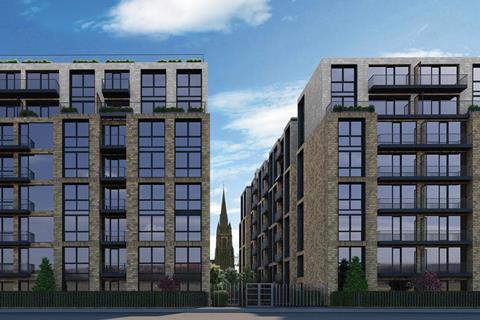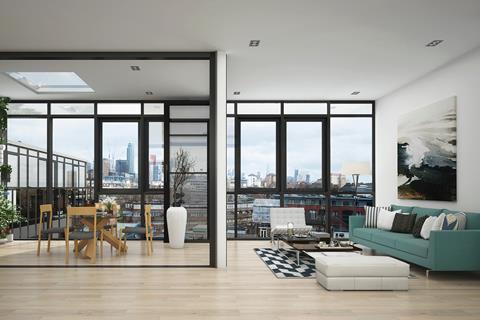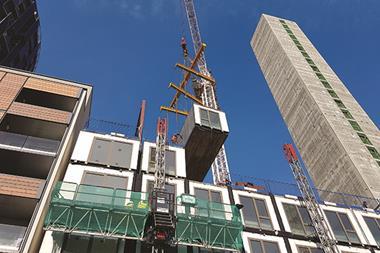It has taken Slough a long time to shake off its reputation as a soulless town, but thanks to a £1bn regeneration project and the impending arrival of Crossrail, it is becoming an increasingly attractive place to live.

It is also becoming an increasingly attractive place for residential developers to do business.
Just ask Click Properties. It is currently on site with a 238-home scheme called Aspire – the largest modular private residential development in the town.
So what drew the developer to Slough and why has it decided to go down the modular route?
According to Click chief executive Aaron Emmett, the company has had an eye on the town since 2015. “Slough as a town got a bad rap from David Brent and [as the setting for] The Office, but the amount of regeneration that has taken place there in the time I’ve been focusing on it has been very positive,” says Emmett.
He alludes to the £1bn capital investment that has been ploughed into commercial and residential development in the town in recent years and to Slough Borough Council’s investment in the major overhaul of the town’s sports and leisure facilities.
Plans to build a £550m mixed-use scheme on the former Thames Valley University site and talk of the Queensmere Observatory shopping centre being demolished and replaced with a new shopping destination will, if they come to fruition, also add to the town’s appeal.
Then, of course, there is Crossrail, which was one of the main things that drew Emmett to the town. Construction on Click’s development at Herschel Street is expected to be completed in mid-2019 ahead of the opening of Crossrail in December 2019, which will enable people to travel from Slough to Bond Street in 32 minutes.
Compelling location
“There are some compelling reasons to buy in Slough,” says Emmett. “As a buyer I can go to work in the City and get an apartment for a fraction of what it would cost in London, and spend my weekend exploring Windsor Great Park.”
Aspire will feature studio, one-, two- and three-bed apartments – 50 of them classed as affordable – as well as a number of penthouses.
Emmett hopes the ongoing regeneration of Slough, coupled with the town’s enhanced transport links to the capital, will attract young professional buyers to the scheme.
He concedes that some people might be put off at the thought of buying modular-built homes, thanks to their association with boxy, budget developments, but he doesn’t think this perception will be a problem at Aspire. For each apartment, Click is offering 50 different types of specification, including the option to turn units into ‘smart homes’ fitted out with the latest ‘Internet of Things’ technology.

“The most common comment I get is that this [Aspire] doesn’t look like a modular building,” says Emmett. “When a consumer walks in and sees the quality of the build and walks around the apartments they will find it stands out. They are apartments that are spacious and that feel right.”
Emmett says the key benefits of going down the modular route include quality control, the ability to retain construction staff, the ability to make progress regardless of the weather and the ability to turn the project around quickly.
He notes that while the construction industry is in the midst of an ongoing shortage of skilled workers, the factories that manufacture modular units are facing no such shortage.
“There’s a problem with the general construction skills base, but if the construction is happening in a factory, as ours is in the north of the UK, the guys working there have that consistency of a job,” says Emmett.
“They can turn up at the factory every day rather than travelling to a site in London and back. It makes a big difference to staff retention.”
Progress is already well under way on the 600 modular units that will be shipped to Slough and pieced together on site.
“We are looking for a 14- to 16-month build programme,” says Emmett. “Normally [if it was built in the conventional way] it would take 18 months to two years, if not longer. I am cracking the whip and saying it has to be less, but if it comes in at 16 months that is still an achievement, especially when you look at the build quality.”
Different mindset
Emmett says that the company has had to adopt a different mindset to ensure it can adhere to such a rapid delivery timetable.
“There’s a different design and construction thought process [required],” he says. “We’ve had to consider everything at the front end. There are key aspects of what you have to do differently, most of it to do with planning and initial design.”
This is especially important because, unlike using conventional construction methods, mistakes on modular projects are harder – and sometimes impossible – to correct.
“You have to be right first time,” says Emmett. “Making sure the team, our contracting team and the modular manufacturers themselves understand this is important.”
To ensure things ran smoothly from the outset, Emmett spent a lot of time selecting a management team with the right core competencies to deliver a project of this nature.
“As a company, we have brought in key members of the team who have this experience and who have delivered [modular] units in parallel industries,” he says. “One of our non-executives was managing director for the Potton Group, which is experienced in modular construction for clients including Travelodge. You also need a creative architect who understands and can think in terms of the delivery.”
“My properties will be delivered bang on time – that means we can recycle our cashflow”
Aaron Emmett, Click
Another challenge Emmett identifies is the cashflow requirements associated with modular buildings versus those of conventional construction.
“From a balance sheet perspective it is top-heavy,” he says. “For us, the cost curve is far more aggressive in the middle stages, so the emphasis is on managing the completion timeline. For all intents and purposes, 60% of the development will be done in the factory and at a faster rate than on a traditional build, when you would expect your development finance to be at its peak right at the back end of practical completion.”
He continues: “Traditional developers rely on land banking, holding on to stock and releasing it in phases. My properties will be delivered bang on time – that means we have the ability to recycle our cashflow and our capital.”
Emmett is confident the company’s modular approach will pay off handsomely. He’s equally confident that after many years in the doldrums, Slough is well placed to cast aside its soulless reputation.































No comments yet